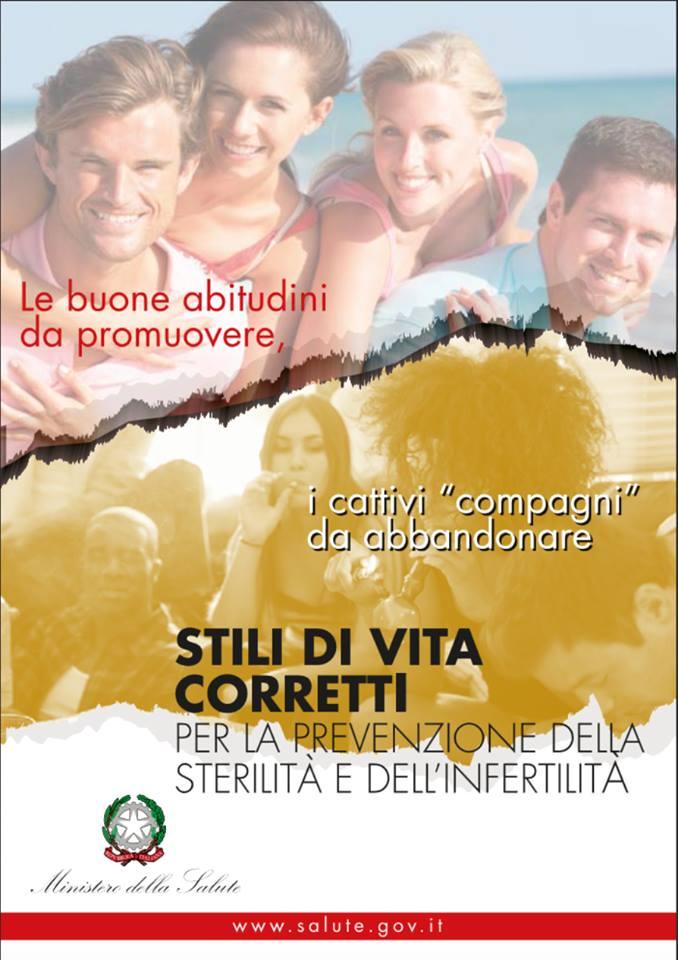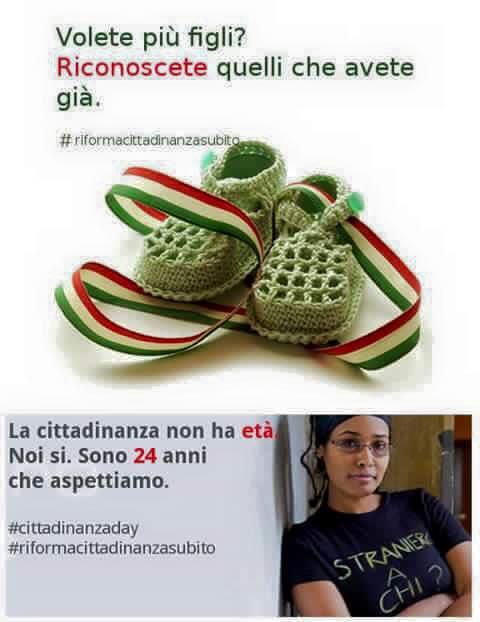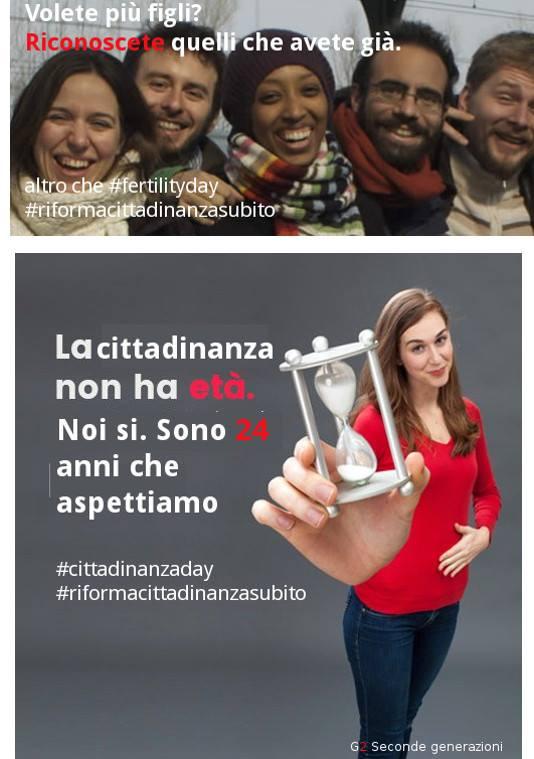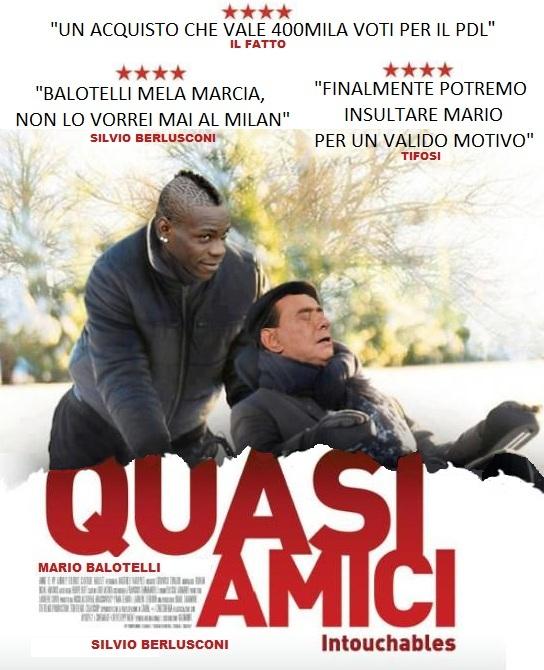
Fertility Day Campaign II
From bad to worse. This is personal, therefore political.
The first Fertility Day campaign provoked outrage in all of Italy, whereas the second one surpassed discontent in the country alone and proceeded to shock of the rest of Europe. The Fertility Day campaign II, targeted young people and aimed to make them aware about the dangers of bad behaviours that might lead them to infertility.
What was remarkable about this campaign was the choice of contrasting images utilized to represent good and bad behaviours linked accordingly to white and non-white people. Those images were perceived by many as racist; this sparked a discussion among Italians with a diverse background about how they are represented and perceived by the Italian society and about the consequences of the Italian ius sanguinis citizenship law that makes them actually 'Italians Without Citizenship'.
Both the first campaign and the second have been condemned by the Minister of Health; the latter only within a couple of days of publishing, due to the enormous amount of negative reactions.
Fertility Day Campaign II.

The poster under consideration employed to promote a second campaign targeting young Italians that, according to the Minister of Health, Beatrice Lorenzin, are the ones most likely to lose their fertility because of their bad lifestyles.
In that poster, 'good lifestyles' are represented by young white people with blond and brown hair and pearly-white smiles. Contrarily, the 'bad lifestyles' are associated with non-white people with a seemingly diverse background. This poster was released after the first Fertility Day campaign, and it has been developed together with other posters. All of them were meant to become huge city banners, but this last poster was the straw that broke the camel’s back. In reaction to this campaign, Italians’ disapproval on social media reached such an extent that the Minister of Health decided to take down the website and withdraw all the posters within the second day of Fertility Day campaign.
The top of the poster reads: ’Good habits to promote’ whereas the middle section says ‘Bad people to stay away from’. In bold and at the bottom it says: ‘Proper lifestyles for the prevention of sterility and infertility’. The upper image of the poster represents 'the good behaviour to promote' with two white/caucasian couples doing nothing in particular. Clearly, it is not what they do that is associated with a good behaviour. Semiotically, the poster suggests that it is what they are that constitutes fertility. It was exactly this semiotic meaning that left everybody perplexed.
Reactions on social media about this image were the most disparate. Some people interpreted the 'good behaviours' as simply being white with light colored hair; others understood it as being white with light-colored hair while smiling; whereas others interpreted it as a break away from Christian values and read the poster as a promotion of 'swinging' otherwise known as 'partner swapping'.
The most 'accurate' interpretation turned out to coincide with 'the smiling behaviours' supporters, as the image was later discovered to be taken from a dental care clinic.

On the contrary, the lower image of the poster stating ‘bad people to stay away from’ represents only non-white people with a diverse background sporting diverse hairstyles among which a girl with Afro hair stands out.
Several reasons sparked Italians’ outrage regarding this poster. To begin with, the choice of using solely Caucasian people to represent 'good behaviors’ was criticized both for the lack of diversity of the characters and because the image does not show nor imply which are those ‘good behaviors’. Indeed, the 'good' characters are not doing anything except for smiling, letting the viewer wonder if the ‘good’ has to do solely with being Caucasian. In the other image, the ‘bad people' besides being represented solely with non-white diverse people, are clearly pictured carrying out recognizable bad behaviors. Indeed, three out of six characters are smoking, one is showing an alleged bottle of alcohol and the two others are partially represented (as their figure is not entirely visible) while acting in a way that could be perceived as taking drugs.
Furthermore, from a communicative perspective, the text of the poster fails a coherent narrative stream based on the opposition of two messages. In fact, following the text ‘good behaviors’, one would expect to read about ‘bad behaviors’; however, the message concludes with ‘bad people to stay away from’'.
Apart from the failure of the narrative stream, the representation of this category of people linked with the message ‘bad people to stay away from’ was a slap in the face to all the non-white Italians with a diverse background. As by any means, they are not all smokers, drinkers or alleged drug-users as one might interpret by looking at the picture. Soon after the launch of this campaign, it has been found out that the very same picture was taken from a poster advertising a rehabilitation clinic.
.

Italians with a diverse background are mainly G2 that is, second generations of immigrants. G2 are mainly born in Italy and all of them have been raised in Italy. But Italy still fails to recognize them administratively as Italians because of an outdated citizenship law implemented in 1992. Sticking to this law, children that were born in Italy by foreign parents are considered on paper 'foreigners' (like their parents) until the age of 18. Once they reach the adulthood, Italy gives them just one year to prove their Italianity and request citizenship. This whole process should be done within one year because once the Italian-born person turns 19, he or she loses the right to apply for the citizenship. After age 19, the person has to start an application ex novo as if he or she had lived in Italy just from that time onwards.
All this is explained by the Italian forma mentis according to which 'Italian' is a person who has Italian blood. This way the ius sanguinis approach prevents those Italians de facto from being Italian de iure; therefore, without equal rights compared with their Italian-blooded peers, this makes them ultimately feel like foreigners in their own country. Those Italians de facto (otherwise known as 'Italians Without Citizenship') often pursue their studies during the process of obtaining citizenship. To continue studying as adults, they are required to prove to have a certain income and to finish their studies on time so to avoid repatriation to a different country. Although, through the difficulties raised by this kind of bureaucracy, Italians with a diverse background proved to be hard working students. According to recent statistics on University graduates (Eurostat, 2016), second generation students have proven to study even more than their Italian-blooded peers. Indeed, while among G2, 26,7% of the people hold a university degree, while the percentage among 'native' Italians is only 19.1%. This proves the inconsistency of the misrepresentation of diverse Italians in the Ministerial poster.
Later on, once G2 people obtain a bachelor or master's degree and realize that higher education does not automatically equate higher opportunities in getting a job, if they have the possibility- they look for another country to migrate to. A country in which they might have, if not better, at least equal opportunities.
The personal is political
For all these reasons, the Fertility Day campaign II poster made Italians with a diverse background not only outraged, but also sad and frustrated. Despite those feelings, Italians de facto -who are self-organized in the collective LaReteG2- ironically counteracted the institutional poster with a revisitation of its message (pictured in the 4 images below). Further, LaReteG2 responded to the Minister of Health also by creating the hashtags #RiformaCittadinanzaSubito (#ReformCitizenshipNow) and #ItalianiSenzaCittadinanza (#ItaliansWithoutCitizenship) referring to the proposal of a tempered ius soli citizenship reform approved by the Italian Chambers of Deputies, but that still has been blocked at the Italian Senate for more than a year now.
La rete G2 counteractions to the Fertility Day campaign II poster have been the following:

Upper image 'Do you want more kids? What about recognizing the one you already have?' Lower image 'Citizenship does not fade. We do. It’s 24 years that we have been waiting #ReformCitizenshipNow'. On her T-shirt Medhin Paolos , Italo Eritrean activist from LaReteG2 , states 'Who are you calling a foreigner?'

Upper image 'Do you want more kids? What about recognizing the one you already have?' Lower image 'Citizenship does not fade. We do. It’s 24 years that we have been waiting #ReformCitizenshipNow'
With this second campaign, the Minister of Health represents again the inconsistency of most Italian politicians ruling the current Government. Indeed, besides preaching to procreate at a young age without having done so herself, she is also misrepresenting Italians with a diverse background portraying them as drug abusers and not considering that they attend university more than their Italian-blooded peers. In this case, the inconsistency of the Minister is exemplified in her education path as she does not even hold a bachelor's degree. Indeed, the Minister of Health -who owns solely a secondary school diploma- is the one in charge to decide which medications can be implemented by Italian doctors.
As Carol Hanisch, the famous feminist thinker and activist, stated The Personal is Political. With this in mind, some of those 'bad people' (who happen to be university students) took it very personal, and on social media they reacted personally and in different ways. Among those, they counteracted with the creation of the hashtag #CattiveCompagnie (#BadPeopleToStayAwayFrom) giving the example of how 'bad' they are.
In my personal case, I reacted with a video that I shared on Facebook addressed to the Minister of Health stating who I am and showing with pride a picture of myself with my Afro hair. This same photo has been used by Tilburg University to sponsor the Research Master in Language and Communication, one of the most demanding from the Faculty of Humanities.
In the video, I asked to have an explanation of the ideology that lies behind the message of the Fertility Day campaign II poster, that in my opinion stands in the never-revisited institutional racism that is rooted in fascist ideology. Further, I asked for an explanation about the whole communication within the campaign as I am an Afro-Italian university student completing a Communication degree. Ultimately, I asked for immediate resignation of the Minister Lorenzin, even though it is known worldwide that Italian politicians are not keen on resigning, even if they are the most disgraceful.
Institutional racism
An example of the inconsistent behaviour of some Italian politicians while ruling the country is given by the not-so-politically-correct statement of the former Prime Minister and President of A.C Milan football club Silvio Berlusconi.
The recently-discovered statement of the ex-Prime Minister (expressed while he was ruling the country) targeted Mario Balotelli, the first Afro-Italian playing in the National team and also a player for A.C. Milan football club.
Silvio Berlusconi’s statement referring to Balotelli’s partner was: 'A girl that goes with a nigger makes me sick'.
Berlusconi's statement is now deposed as one of the pieces of evidence against him in the trial Ruby Ter referring to the Bunga Bunga gate. Balotelli’s statement indeed is a key incident that unveils how some Italian politicians perceive and treat diverse Italians: even if talented, virtuous but not fully Italian-blooded, they are to be offended and demeaned.

A revisitation of the poster of the French movie 'Intouchables' translated in Italian as 'Almost friends'. First comment: 'the bought player that is worth 400 thousands votes to PDL (Berlusconi's party for freedom). Second comment on the left: 'Balotelli is a bad apple, I wouldn't like to have him at A.C. Milan'. Third comment on the right 'Finally, we will be able to insult Mario for a good reason '.
Further, within the inconsistency frame, the Minister of Health represents an incoherent model for her Fertility Day campaign I , which pressures women to procreate while young, because she herself had a couple of twins at age 43. Furthermore, she is giving a representation of diverse Italians as drug abusers and not considering that they are university students.
All in all, this Fertility Day campaign incident is a tiny reflection of the behaviour of the current government. Sadly, it has to be seen as a wider portrayal of some Italian politicians’ behaviours and values they represent: laxity, inconsistency and institutional racism.
But young Italians without citizenship are resilient, and despite all the difficulties, they keep on fighting for their rights. Indeed, to solicit the reformation of the 'Citizenship Law' which has been stuck at the Senate for one year, on 13th October they organized a flash-mob in several Italian cities. During the demonstration, everybody wore the same outfit. A bright white blanket to represent how they are perceived by the Italian Government: ghosts.

Questa è Roma (This is Rome) FlashMob in Rome on 13th October 2016. . On the left, holding her smartphonen we see Kwanza Musi Dos Santos,the Italo-Brazilian activist and co-founder of Questa è Roma. In the center, the Italo-Somalian writer and activist Igiaba Scego holds the banner #ReformCitzenshipNow!
For a better understanding of what an 'Italian Without Citizenship' has to undergo, a video about Sonny, an Afro Italian, is a good resource. The video is subtitled in English and explains that Sonny was so good in playing basketball that he was selected to play in the Italian National team. Unfortunately, as he did not obtain an Italian passport by age 19, he had to give up his dream of playing his favourite sport at a national level, unlike his other Italian-blooded peers. In the video, Sonny further describes how 'Italians Without Citizenship' are reacting in order to improve the legislation in Italy: it is the only country they know, but it does not want to recognize them as Italians.
As an ultimate constructive criticism to the last poster, many Italians who work successfully in the field of communication have proposed their expertise to the Minister. She claimed to appreciate this and welcomed their proposal under the one and only condition that their work should be given for free. This ultimate remark, given by the Minister in an interview at the television to explain the campaign, made most of the Italians' outrage turn into a laugh; demonstrating one of the true Italian values of always being cheerful, no matter what the problem is, as stated by the recently disappeared Prize Nobel for the Literature Dario Fo in his 1968 song Ho visto un re.